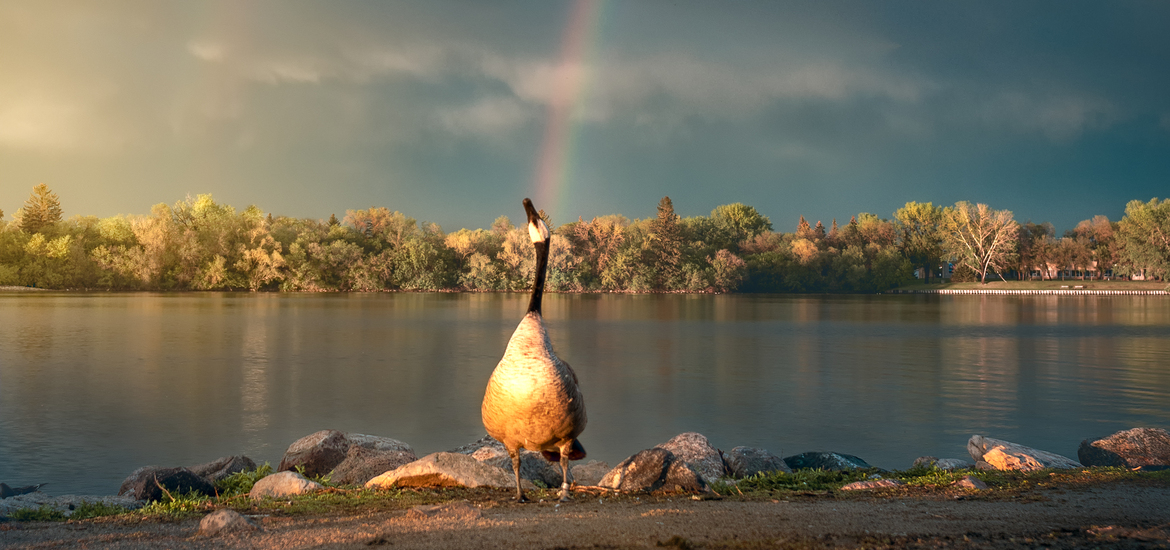When Covid-19 arrived on our collective doorstep in March, I made a quick decision to pack up many of my belongings, a bunch of food, and head out to the family farm to stay with my widowed dad for as long as I needed to while things were shut down. It was partly to keep him company, and it was also to put my own mind at ease, fend off some loneliness and anxiety, and be close to nature and to my own roots. In essence, I felt a deep need to “go home” – to my dad, to my farm, to my heritage. I found myself rekindling skills and traditions that had dropped away in my busy life the past few years – cooking meals from scratch, baking bread, and knitting. I was re-watching movies from my childhood, reminiscing with my dad about family memories, and thinking a lot about what I valued most.
It was a dramatic shift from my usual busy lifestyle where I spend much of my time travelling around the province for work on the road. Though I felt a great deal of uncertainty and loss, I was also grateful to have that time with my dad and to be on the farm again, watching spring slowly arrive. I also used that time to spend long hours on the phone with friends and family near and far. I deepened my relationships, and in so doing, realized just how important they are to me, and to everyone. As many of the usual demands of everyday life fell away as my primary concern became: are the people I love okay?
I continued my work with Heritage Saskatchewan from the farm. What I saw on the news and read about online gave me much to think about. It turned out I wasn’t alone in turning to elements of my living heritage to cope with the pandemic. It was clear we were collectively living through a historic event, one that may have far-reaching implications we can only speculate about now. Already, people were making statements like, “before Covid,” a term which may become commonplace in the years and even decades to come. And here we were, living our lives “during Covid,” all wondering what life might look like “after Covid” – whenever and however that may be.
These ponderings, and conversations with my colleagues at Heritage Saskatchewan, seeded the idea for a living heritage project to capture voices in real time of Saskatchewan people living through the first wave of the Covid-19 pandemic. In Saskatchewan, a province of astounding diversity, we do not always know each other’s stories and experiences. An event like the Covid-19 pandemic is universal in that all of us were forced to contend with its effects on our daily lives. We wondered how people across Saskatchewan were experiencing the changes wrought by Covid-19, and what we could do as an organization to document this extraordinary time.
We partnered with the Saskatchewan History & Folklore Society, an organization with a long history of preserving the stories of Saskatchewan people. History is what future generations will read, but for us, right now, this is living heritage. We are experiencing this through our own viewpoints, informed by what has come before us. In that sense, it’s not so different from the previous living heritage projects we have done. But this one presented some huge challenges before it even started. Usually, I spend a lot of time in a community before and during the process of a living heritage project, but this was now impossible. We realized that if we wanted to hear from many different voices all across the province, we had to get creative, and we had to ask for help. We drew upon existing relationships with people we knew had the skills, the connections, and a passion for telling stories. From the start, we intended this to be a documentation project destined for long-term preservation in the Provincial Archives of Saskatchewan. Later on, we decided to publish edited versions of the interviews in a special edition of Folklore magazine.
Find the document here: Covid-19 Culture: A Living Heritage Project of the Pandemic in Saskatchewan
We contracted six community coordinators: Louise BigEagle, a filmmaker from Regina; Joey Donnelly, a folklorist from Herbert; Christine Fiddler, a historian from Saskatoon; Marcel Petit, an artist from Saskatoon; Pierrette Settee, a digital media artist and teacher-in-training from Cumberland House, and Holly Toulejour, a social worker from Prince Albert. All six have experience conducting interviews, strong ties to communities all over Saskatchewan, and a keen appreciation for cultural heritage. They were given the task of identifying community participants from a wide range of ages, occupations, locations, and cultural backgrounds, a list of questions, and the instructions to record interviews, in whatever format worked best for them. Additionally, I interviewed them about their experiences, and recorded three community interviews. The results are 41 audio and video interviews.
The full interviews and their transcripts will be available on the Provincial Archives of Saskatchewan website in February, 2021. Edited narratives of the interview material, along with photographs, were published last week in Folklore magazine. I invite you to pore through its pages and come to know some of the stories of the first wave of Covid-19 Culture in Saskatchewan. I found that many of the thoughts, fears, and unexpected positive effects shared in the interviews mirrored my own experience. Perhaps you will discover the same. In all, I believe the stories shared in the Covid-19 Culture project illuminate the common ground we share as the pandemic changes life for us all living here, in Saskatchewan, in 2020.


